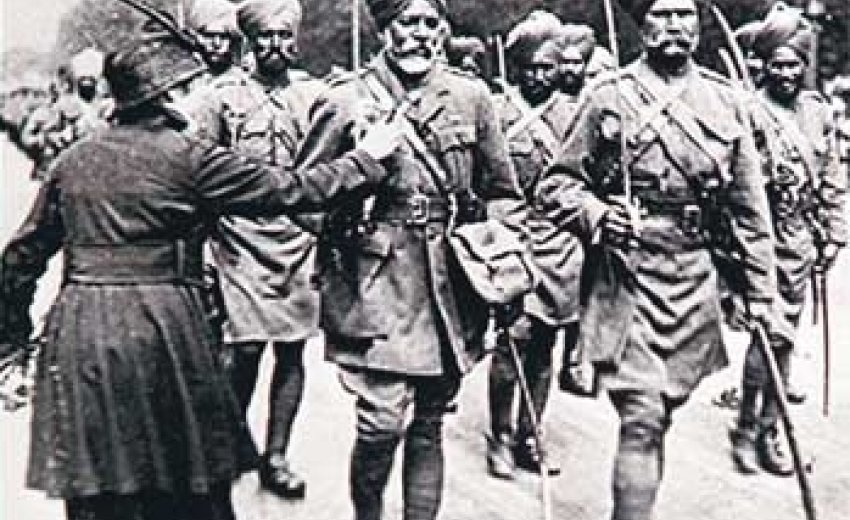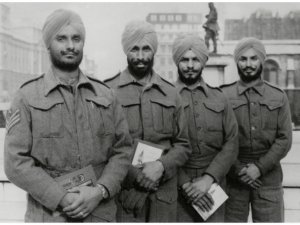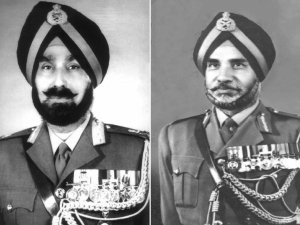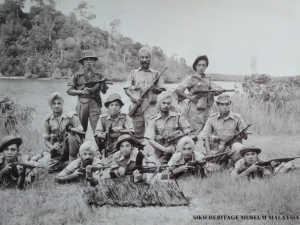SIKH BRAVERY ON MANY BATTLEFRONTS
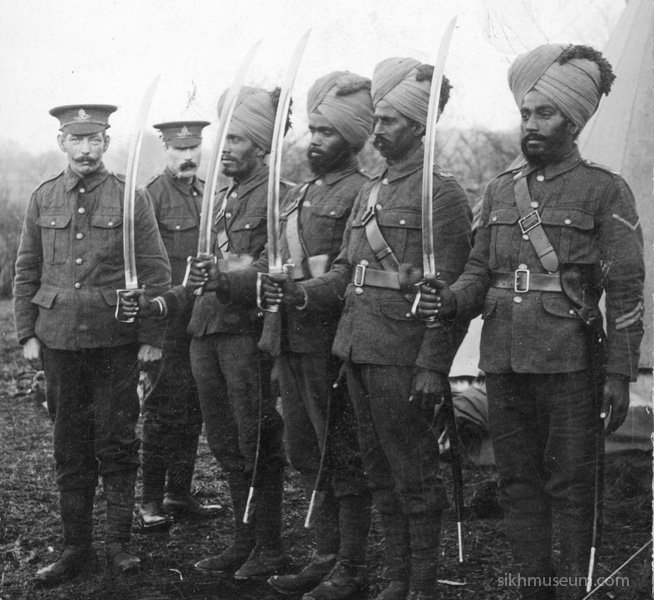
The Sikh Soldiers since times immemorial have been in the forefront of all wars to fight against the forces of evil. This privilege should be extended to the Sikh people, who throughout the history of the world have spilled their blood unflinchingly to protect civil liberties.
"Our Sikh leaders have been talking about ancient historical and cultural links, but little is known about the far more recent history of the Sikhs in the Battlefronts"
Sikhs from the Northern state of India, spring from martial races, whose fighting traditions are still proven on the battlefields where their units are engaged and whose valour is not exceeded by any troops of any other nation.
Sikh military achievement is well known throughout the world and the bravery and versatility of its soldiers is unquestioned and forever stamped in history. Sikhs has contributed more soldiers to the Indian Army in proportion to its numbers than any other class in India. Units of the Sikh Regiments have been entrusted with too many vital tasks for there to be any doubt of the Indian Army's value to the Allied cause. As is well known, India has the largest volunteer army of all time, an army of more than 2,000,000 men drawn from every stratum of Indian life and every part of the country. The bulk of the Indian Army was recruited from the north, which is the origin of the traditionally martial race, who had won many decorations in the battlefields.
The success of their task is obvious from the long list of awards for gallantry and fighting skill-shining tributes to India's martial spirit which come from the battles in North West Frontier Province of British India, China, Malaya, Burma, Italy, France, Belgium and Middle East. Sikh courage, endurance and fighting efficiency have been demonstrated to the world in North Africa in the first stages of the war and later in Italy and Burma, where Indian soldiers have won for their regiments new battle honours which will never be forgotten.
Not many historic or photographic records exist regarding the contribution of Sikhs in the Battlefronts. Here are some interesting anecdotes that one should read.
Some Interesting Anecdotes.
North West Frontier Province
The Battle of Saragarhi was fought during the Tirah Campaign on 12 September 1897 between twenty-one Sikhs of the 4th Battalion (then 36th Sikhs) of the Sikh Regiment of British India, defending an army post, and 10,000 Afghan and Orakzai tribesmen.
In the battle, all 21 Sikh soldiers chose to fight to the death instead of surrendering thus proving their loyalty and devotion to their sovereign, the Queen Empress of India, and gloriously maintaining the reputation of the Sikhs for unflinching courage on the field of battle. When the gallantry of Saragarhi was recounted to the Parliament of the United Kingdom, the recitation drew a standing ovation from the members. All the 21 received the Indian Order of Merit (IOM) Posthumously.China
The history of the Boxer Rebellion is well known. What isn't is the crucial role played by troops from the Sikh Regiments.
In Beijing, for 55 days, the Boxers laid siege to the heart of Beijing. On August 4, 1900 the soldiers of the Eight Nation Alliance left the city of Tianjin to march to Beijing to relieve the Siege of the Legations. A relief force of more than 3000 soldiers from Sikh Regiments were dispatched in lifting the siege, which eventually paved the way for the occupation of Beijing by foreign troops.
The Battle of Yang Tsun was a battle during the march of Eight-Nation Alliance forces from Tianjin to Beijing during the Boxer Rebellion. In the Battle of Yang Tsun, the post of honor in the fighting was taken by a British regiment of Sikhs ( 24th Punjab Regiment) and a regiment of Americans, who raced each other over a plateau of 5000 yards, exposed to a fierce hail of shell and rifle fire, to occupy a formidable entrenched position. Eventually the Sikhs and the Americans reached a position within 300 yards of the enemy. Then the order was given to fix bayonets, and a simultaneous charge was made, immense slaughter being inflicted upon the Chinese. The battle culminated in a brilliant charge of the Sikhs and American forces. Simultaneously the British Sikhs and the 14th American Regiment occupied Yang Tsun.
Malaya
The Malayan Campaign was a campaign fought by Allied and Japanese forces in Malaya, from 8 December 1941 - 31 January 1942 during the Second World War. Sikhs represented more than 60% of the British Indian Army in the Campaign. The gallantry and devotion to duty shown by these Sikhs were beyond praise.
The Battle of Kampar
From December 30, 1941 to January 2, 1942, a battle between 3000 British personnel and over 6000 Japanese soldiers erupted. The 11th Indian Division managed to delay the Japanese advance at Kampar for a few days, in which the Japanese suffered severe casualties in terrain that did not allow them to use their tanks or their air superiority to defeat the British.
A Sikh company of the 1/8th Punjab Regiment throw back a furious attack with a classic bayonet charge through massive mortar and machine-gun fire. Only 30 members of the company survive the action but the position held. The Japanese lost more than 500 men here and Japanese commanders, for the first time in the war, consider retreating.
The Battle of Kluang
On January 30, 1942, a Sikh Battalion made an ambush on a strong Japanese party north of Kluang, Johor. The Japanese squealed with absolute panic when charged with bayonets. Sikhs captured 250 motor cycles and 150 bicycles when they charged the Japanese positions and machine-gun post. Further details of the attack made by the Sikh Battalion North of Kluang reveals that the enemy casualties numbered at least 400. Two small field guns and many mortars which were tied on their bicycles and Tommy-guns were also destroyed.
Burma (Myanmar)
The story of the Burma campaign is multi-facetted. The fighting took place not only in jungle but in mountains and across the arid Burmese plain, baked as dry as a desert in the summer sun. Men often fought face-to-face and hand-to-hand but the campaign became very much a modern war seeing the airlifting of entire divisions, aerial re-supply, landings by glider, casualty evacuation from small jungle airstrips and the deployment of landing craft in support of sea borne invasions and river patrols.
In the end Japan suffered her greatest defeat on land in her history and the chief instrument of that defeat was the Sikhs from Indian Army. Singhs won 7 VC's in Burma Campaign. They are Lieutenant Karamjeet Singh Judge of 15th Punjab Regiment, Naik Gian Singh of 4th Battalion 15 Punjab Regiment, Naik Nand Singh of 1st /11th Sikh Regiment, Havildar Parkash Singh of 8th Punjab Regiment, Subadar Ramarup Singh, Jemadar Parkash Singh of 13th Frontier Force Rifles and Subadar Major Umrao Singh of Royal Indian Artillery.
Italy
During the Second World War, the Sikhs in Italy played a predominant role in the many battles fought, what is collectively known in military history as the Italian Campaign. The story of their bravery and their sacrifice is still talked about in Italian cities and villages that they helped to liberate. However, the full account of their bravery is not available to the wider public.
More than half of the country saw the Sikhs fighting against the Germans right from the first assault on the Gothic Line in August 1944, to the last assault on the Senio River in April 1945. During these months the Eighth British Army included the Fourth and Tenth Indian Divisions. These Indian Divisions had the famous Gurkha and Sikh Regiments who had been serving the British Empire for a Century.
The Indian forces though limited to the strength of 4, 8 and 10 Indian Division, distinguished themselves for courage and tenacity in the battles of the Sangro, Cassino, the Liri Valley, the Gothic line, the Senio and several other engagements.
In the liberation of Ferrara according to the testimonies of that time, Indian troops were among the first to reach Ferrara. They were part of the 5th Corps of the 8th British Army and were composed mainly by Sikh soldiers. After the liberation of Ferrara, these troops were deployed in Porotto, on the way leading to the Po River which ran along the Gothic Line.
On 9th August 1944, a fierce fighting took place on the mountains both side of Arezzo-Florence road, where Gurkhas and Sikhs captured Monte Nano, which is almost on the crest of the Prato Magno. Indians also captured the 4,000-ft. high Lacesta.
History speaks for itself on the valour, bravery displayed by the Sikhs. The never-say-die spirit of the Sikhs gave us the impetus and inner strength and resilience to face any challenges that came our way. Sikh soldiers adhered to the faith and never flinched nor surrendered in the face of adversity.
The anecdotes reveal the genuine expression of the bravery, dedication and the unity of the Sikhs exemplified by the Sikhs in battlefields and evidently, they faced any challenge without any fear or trepidation.
France
On 26th of September 1914, the 15th Ludhiana Sikhs arrived at Marseilles, followed by the next day by the 47th Sikhs. Besides, these pure Sikh units, other units of mixed ethnic men (including Sikhs), like the 57th Wilde's Rifles soon arrived in France. The French were thrilled to see tall, handsome, bearded and turbaned Sikhs from the east coming to defend their country.
The Battle of La Bassee
Sikhs played a predominant role in the major battles during the World War 1 in France. For instance in the Battle of La Bassee, Sikhs made a traditional bayonet charges together with the Gurkhas.
The sanguinary fighting in the battle cost the Germans 20,000 dead or wounded in the bayonet charges. The British losses did not exceed 2,000. An eye witness account stated that "Suddenly an avalanche of men was let loose. A section of' a line of British infantry out winged the enemy rank after rank, but the rush was irresistible, and the British entrenchments were carried .The defenders did their duty to the last." The German advance 'was not merely checked. It was beaten and broken. The Indians ran through the German lines, pouring the foe back to receive from right and left the fire from the British infantry. The Indians were not content, with recapturing the trench, but, leaping it. They pursued the Germans downhill until their officers recalled them."
The Battle of Festubert
There was one occasion at the Battle of Festubert when 10 brave Sikhs (4 from the 15th Ferozepur Sikhs, 4 from 19th Punjabis and 2 from 45th Sikhs) were chosen to carry bombs. These 10 had displayed exemplary courage and devotion to duty. The bombs were to be taken from the support trenches to the front line, a distance of 250 yards, where the 57th Wilde's Rifles and 34th Sikh Pioneers were holding the Germans. The distance was well covered by enemy machine guns. As there were no ropes available, the Sikhs pulled the boxes with their own turbans. The selected ones went ahead under heavy German fire, and when they were short of about 40 yards from their destination, only Lieutenant Smyth and 3 Sikhs were left. It now became impossible to pull the boxes.
A decision was made to open the boxes and carry two bombs at a time and rush the remaining distance. In the process one more Sikh fell. The remaining Sikh and Lt. Smyth succeeded in their task. Lt. Smyth was awarded the Victoria Cross for bravery and Lance Naik Mangal Singh the order of Merit, and the other 9 Sikhs the Indian Distinguished Service Medal.
We have always upheld these ideals as is evidenced until today by the professionalism shown by our troops in various peace keeping operations around the world. Their chief attribute in the battlefield is said to be their fearlessness.
The Prince of Wales, addressing a parade of the Indian Army Corps before their departure from France, conveyed the following message from the King - ( 27th December, 1915 )
"Over a year ago I summoned you to fight for the safety of the Empire. You honoured my pledged word, and my confidence in your sense of duty and your courage and chivalry have since been nobly justified. I now require your services in another field of action, and I wish to express my satisfaction at your conduct on the battlefields of Belgium and France - the toils and hardships you have undergone , your courage and endurance, often against great odds, and your noble deeds in the ever memorable conflict. In this warfare, under new conditions and in peculiarly trying circumstances, you have worthily upheld the honour of the Empire and the great traditions of the Indian Army, and I shall ever hold your gallant sacrifices in grateful remembrance."
Harchand Singh Bedi - Malaysia [email protected]
